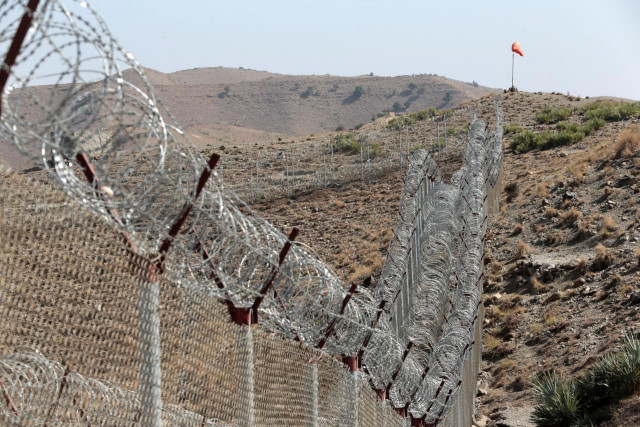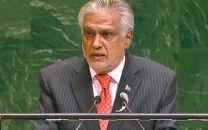Border posts to be upgraded under FATF rules
Action to address concerns about currency smuggling by terror groups

A view of the border fence outside the Kitton outpost on the border with Afghanistan in North Waziristan. PHOTO: REUTERS/FILE
The decisions to ensure effective implementation of the currency regulation regimes and plug administrative lacunas were taken during a meeting held in Q-Block – the seat of the Finance Ministry.
The cross-border movement of currency by the UN-designated groups like the Haqqani network, Taliban and criminals were among the four key areas of concerns that became the base for placing Pakistan on the grey list maintained by the FATF.
The monitoring report by the International Cooperation Review Group of the Asia Pacific Group listed the cross-border smuggling of the currency as one of four key areas of concerns. The report stated that “terrorist groups operating in Pakistan are able to continue financing themselves with little difficulty”.
However, Pakistan denies the allegations.
The country is supposed to deliver on four actions between January to September 2019 to address concerns regarding cross-border currency smuggling.
Pakistan enacts ambitious reforms to comply with FATF
Finance Minister Dr Shamshad Akhtar stressed the need for “effective implementation of the integrated database for monitoring and enforcing SBP's currency regulation regime at all ports of entry”, according to a handout of the Finance Ministry.
She said it was important that authorities at the border points should enhance the coordination and cooperation by sharing information on currency smuggling.
Customs and other agencies need to work together to improve border controls and effective internal co-operation was essential in order to effectively control the problem, the minister added.
The meeting also reached a consensus on physical and technological up-gradation of systems at all ports and other checkpoints along the borders. The meeting observed that legal provisions to check currency smuggling and bring to book those involved in the crime were in place.
However, the authorities concerned admitted that “effective implementation and further consolidation in this area should be enhanced”.
The meeting also emphasised close coordination among agencies and institutions concerned at airports and border checkpoints for effective control of the currency smuggling. There was also emphasis on ensuring currency declarations by passengers on all incoming and outbound flights besides scanning of passengers’ belongings.
FATF move ‘unjust’, Trump aide told
The finance minister said that as part of steps to check terror financing and menace of money laundering Pakistan needed to put in collective efforts to check the currency smuggling through our borders to control terrorism and other criminal activities.
She also said that it was important that the authorities concerned properly identify and understand the nature of risks of cash couriers that are being used for terror financing. This was action number 1 in the area of currency smuggling that Pakistan has to deliver by January next year.
Dr Shamshad said that there was a need for further strengthening the currency/bearer instruments declaration/seizure regime at all ports of entry by applying effective, proportionate and dissuasive sanctions when there are instances of false declaration/failure to declare and currency smuggling.
She directed FBR for immediate assessment of legal regulatory deficiencies as well as tools, instruments and equipment required to put in place checks and controls at ports, entry and exit points to curb illegal currency transportation and smuggling. She said checking currency smuggling would ultimately help the cause of curbing terror financing and money laundering.
The FATF had acknowledged that Pakistan had a cash declaration system and laws in place for incoming and outgoing passengers but it lacked adequate measures to prevent illicit cross-border transportation of cash. Also, law enforcement, including Pakistan Customs, did not adequately share information related to bulk cash smuggling with the financial monitoring unit.
However, Pakistan was of the view that the regulatory framework for controls on cross-border cash and BNI was based on a June 2012 SBP notification.
The persons bringing into Pakistan currencies and/or bearer negotiable instruments exceeding aggregate value of $10,000 or equivalent have to complete a declaration form.
Customs law changes on cards to meet FATF rules
In case of false declaration, legal action can be initiated under the Foreign Exchange Regulation Act 1947 and the Customs Act, 1969.
During the period from 2012 to 2018, the customs authorities seized a total of Rs861.4 million at various borders in Pakistan. Pakistan also reported that money laundering and terrorism financing investigations stemming from those seizures resulted in no terror financing cases but a few money laundering cases.
It also reported to the FATF that in the 88 first information reports (FIRs) there were 62 convictions representing a 70% conviction rate over the period and seizures of around $7 million. In those cases, none of the convicted persons was the UNSC-designated or belonged to the UNSC-designated terrorist groups.



















COMMENTS
Comments are moderated and generally will be posted if they are on-topic and not abusive.
For more information, please see our Comments FAQ